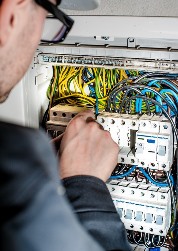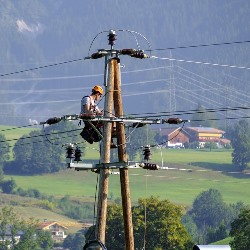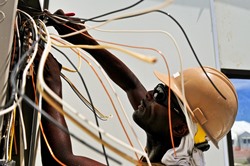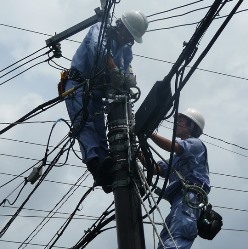How to Enroll in the Right Electrician Vocational School near Dewar Iowa
 The initial step to learning to be an electrical contractor or tradesman is locating an electrician trade school near Dewar IA. But with numerous vocational schools to choose from, just how do you undertake making certain that you enroll in the best one? Particularly since there are so many variables to consider. For instance, many potential students will begin by searching for schools that are nearby their residence. When they have identified a few that are within driving range, they will select the one with the least expensive tuition. Even though location and cost are of importance, they are not the only factors that must be evaluated. Also critical are the accreditation and reputations of the schools, in addition to their graduation and job placement rates. These and additional qualifiers should influence your ultimate judgment when selecting an electrician school. We will discuss that checklist in more detail later in this article. But to begin with, let’s review a little bit about becoming an electrician and the educational options that are offered.
The initial step to learning to be an electrical contractor or tradesman is locating an electrician trade school near Dewar IA. But with numerous vocational schools to choose from, just how do you undertake making certain that you enroll in the best one? Particularly since there are so many variables to consider. For instance, many potential students will begin by searching for schools that are nearby their residence. When they have identified a few that are within driving range, they will select the one with the least expensive tuition. Even though location and cost are of importance, they are not the only factors that must be evaluated. Also critical are the accreditation and reputations of the schools, in addition to their graduation and job placement rates. These and additional qualifiers should influence your ultimate judgment when selecting an electrician school. We will discuss that checklist in more detail later in this article. But to begin with, let’s review a little bit about becoming an electrician and the educational options that are offered.
Click Here to Get Free Information on Electrician Schools Near You!
Electrician Certificate, Diploma and Degree Options
 There are several options to obtain electrician instruction in a vocational or trade school near Dewar IA. You may enroll in a diploma or certificate program, or receive an Associate Degree. Bachelor’s Degrees are available at some schools, but are not as prevalent as the other three alternatives. Frequently these programs are offered in conjunction with an apprenticeship program, which are required by the majority of states in order to become licensed or if you would like to become certified. Bellow are short explanations of the 3 most typical programs available.
There are several options to obtain electrician instruction in a vocational or trade school near Dewar IA. You may enroll in a diploma or certificate program, or receive an Associate Degree. Bachelor’s Degrees are available at some schools, but are not as prevalent as the other three alternatives. Frequently these programs are offered in conjunction with an apprenticeship program, which are required by the majority of states in order to become licensed or if you would like to become certified. Bellow are short explanations of the 3 most typical programs available.
- Diploma and Certificate Programs are generally provided by Iowa trade and technical schools and take about a year to finish. They provide a solid foundation and are aimed towards those who wish to enter an apprenticeship more quickly as a journeyman electrician.
- Associate Degree Programs require 2 years to finish and are provided by Iowa junior or community colleges, commonly as an Associate Degree in Electrical Technology. They furnish a more comprehensive education while providing the foundation that readies students to begin their apprenticeship program.
As earlier stated, Bachelor’s Degree programs are available at certain Iowa institutions, but are less favored at four years than the other briefer programs. Most states require that an apprenticeship of no less than 2 years and in most cases 4 years be carried out before licensing. Therefore, many students are anxious to start their paid apprenticeship, especially if it’s not part of their educational program.
Electrician License and Certification Requirements
 Electricians in Dewar IA can perform a vast array of services, such as testing, installing and replacing electrical systems, and making sure that the wiring in buildings and homes are up to code standards. After concluding an apprenticeship, journeyman electricians are mandated to become licensed in most states or municipalities. The length of apprenticeship differs by state, but normally around four to five years of prior experience is called for in order to take the licensing examination. The exams usually evaluate general knowledge and electrical theory, as well as understanding of the National Electrical Code (NEC). Obtaining certification is also an optional method for an electrician to identify her or himself as a skilled and experienced professional. The certifications offered vary by state and may be acquired in many specialties, including cable splicing as an example. The certification procedure usually entails three levels of proficiency:
Electricians in Dewar IA can perform a vast array of services, such as testing, installing and replacing electrical systems, and making sure that the wiring in buildings and homes are up to code standards. After concluding an apprenticeship, journeyman electricians are mandated to become licensed in most states or municipalities. The length of apprenticeship differs by state, but normally around four to five years of prior experience is called for in order to take the licensing examination. The exams usually evaluate general knowledge and electrical theory, as well as understanding of the National Electrical Code (NEC). Obtaining certification is also an optional method for an electrician to identify her or himself as a skilled and experienced professional. The certifications offered vary by state and may be acquired in many specialties, including cable splicing as an example. The certification procedure usually entails three levels of proficiency:
- An experience requirement
- Passing a written exam
- Passing a practical exam
Examples of certifying agencies include the National Joint Apprenticeship and Training Committee (NJATC) and also the National Institute for Certification in Engineering Technologies (NICET). It’s important that the electrician trade school that you enroll in not only delivers a strong academic foundation, but also helps prepare you for passing any certification and licensing examinations that you may need to take in the future.
Attending Electrician Online Training Classes
 A possibility that you might have contemplated is enrolling in an electrician online program to earn a certificate or degree. Although online training programs have become more popular as a way of attending class without the need for travel, in this situation they are not entirely internet based. Pretty much all electrician training programs require partial attendance on campus to get hands-on practical training. But since the balance of the classes can be attended online, internet learning can be a more practical alternative for individuals that have minimal time for schooling. And as an added benefit many online training programs have a reduced tuition cost compared to their on-campus counterparts. Travelling expenses from Dewar IA are also minimized and some of the study materials can be available on line also. Each of these benefits can make electrician online vocational schools more affordable and accessible. And many are fully accredited, which we will cover in our questions to ask checklist.
A possibility that you might have contemplated is enrolling in an electrician online program to earn a certificate or degree. Although online training programs have become more popular as a way of attending class without the need for travel, in this situation they are not entirely internet based. Pretty much all electrician training programs require partial attendance on campus to get hands-on practical training. But since the balance of the classes can be attended online, internet learning can be a more practical alternative for individuals that have minimal time for schooling. And as an added benefit many online training programs have a reduced tuition cost compared to their on-campus counterparts. Travelling expenses from Dewar IA are also minimized and some of the study materials can be available on line also. Each of these benefits can make electrician online vocational schools more affordable and accessible. And many are fully accredited, which we will cover in our questions to ask checklist.
Points to Ask Electrician Technical Schools
 When you have made a decision to earn a diploma, certificate or degree, you can start to narrow down your school options. Considering that there are so many electrician vocational and trade schools in the Dewar IA region, it’s imperative to have a checklist of qualifications that each school must meet. The first 2 that we mentioned were location and the cost of tuition. If you have an interest in earning an online degree, then that must be a feature that your chosen school offers. And although all three qualifiers may be critical when making your decision, there are other variables that need to be considered as well. Following is a checklist of those added qualifiers that you will need to research prior to choosing an electrical vocational school.
When you have made a decision to earn a diploma, certificate or degree, you can start to narrow down your school options. Considering that there are so many electrician vocational and trade schools in the Dewar IA region, it’s imperative to have a checklist of qualifications that each school must meet. The first 2 that we mentioned were location and the cost of tuition. If you have an interest in earning an online degree, then that must be a feature that your chosen school offers. And although all three qualifiers may be critical when making your decision, there are other variables that need to be considered as well. Following is a checklist of those added qualifiers that you will need to research prior to choosing an electrical vocational school.
Accreditation. A large number of electrician vocational schools have received either a regional or a national accreditation. They may attain Institutional Accreditation, which involves the school’s programs as a whole, or Programmatic Accreditation, which relates to a specific program, for example electrical technology. Verify that the Dewar IA program and school are accredited by a U.S. Department of Education acknowledged accrediting agency, such as the Accreditation Board for Engineering and Technology. In addition to helping ensure that you obtain a superior education, it can assist in acquiring financial assistance or student loans, which are often unavailable for non-accredited programs. Additionally, some states mandate that the electrician training program be accredited for it to qualify for licensing.
High Completion and Placement Rates. Ask the electrician schools you are looking at what their completion rates are. The completion rate is the portion or percentage of students who enroll in and complete the course. A lower completion rate might suggest that students were dissatisfied with the course and dropped out. It might also mean that the instructors were not qualified to train the students. It’s also essential that the schools have high job placement rates. Older and/or more reputable schools may have a broader directory of graduates, which can result in more contacts for the school to employ for their apprenticeship and job placement programs. A high job placement rate will not only affirm that the school has a good reputation within the trade, but additionally that it has the network of contacts to help Dewar IA graduates secure apprenticeships or jobs.
Apprenticeship Programs. Numerous electrician trade programs are taught in conjunction with an internship or an apprenticeship program. Those participating vocational and trade programs will help place you in an apprenticeship program within their network of electrical businesses or labor unions. Find out if the schools you are reviewing have working partnerships with Dewar IA area electricians or electrical contractors. An apprenticeship not only provides a valuable experience by providing hands-on training, but it also provides employment opportunities and helps to form relationships in the area electrician professional community.
Modern Facilities. Confirm that the school facilities and the tools that you will be trained on are up-to-date and what you will be using on the job. If you are presently in an internship or an apprenticeship, talk to the electrical specialist you are working under regarding what you should be expecting. If not, ask a local Dewar IA electrical contractor if they can provide some pointers. Additionally keep in mind that unless you can relocate, the school needs to be within commuting distance of your Dewar home. Take note that if you decide to enroll in an out-of-state school, besides the added relocation costs there might be increased tuition charges compared to in-state residents.
Smaller Classes. It’s important that you receive as much individualized training as possible, which can be challenging in bigger classes. Ask if you can sit in on a few of the classes so that you can observe how big they are and witness first hand the interaction between students and instructors. Talk to a few of the students and get their feedback relating to class sizes and instruction. Finally, speak to some of the teachers and find out what their level of expertise is and what degrees or certifications they hold.
Flexible Scheduling. Verify that the class schedules for the schools you are reviewing are flexible enough to fulfill your needs. If you are only able to attend classes in the evening or on weekends near Dewar IA, check that the schools you are comparing provide those choices. If you can only attend part-time, make sure that the school you select permits part-time enrollment. Additionally, check out what the protocol is to make-up classes should you miss any because of work, illness or family responsibilities.
Electrical Online Schools Dewar Iowa
 Choosing the ideal electrician trade school will probably be the most critical decision you will make to begin your new trade. You originally came to this website due to an interest in Electrical Online Schools and wanting more information on the topic Electrical College. But as we have discussed in this article, there are a number of things that you will need to assess and compare among the schools you are considering. It’s a must that any electrician training program that you are evaluating includes a considerable amount of hands-on training. Classes should be smaller in size and every student must have their personal equipment to train with. Classroom instruction needs to offer a real-world frame of reference, and the curriculum should be current and in-line with industry standards. Programs vary in length and the kind of credential offered, so you will need to decide what length of program and credential will best serve your needs. Each program offers unique options for certification as well. Probably The ideal way to research your short list of schools is to go to each campus and talk with the students and instructors. Take the time to sit in on some classes. Tour the campus and facilities. Make certain that you are confident that the training program you pick is the best one for you. With the right training, effort and commitment, the final result will be a new occupation as a professional electrician in Dewar IA.
Choosing the ideal electrician trade school will probably be the most critical decision you will make to begin your new trade. You originally came to this website due to an interest in Electrical Online Schools and wanting more information on the topic Electrical College. But as we have discussed in this article, there are a number of things that you will need to assess and compare among the schools you are considering. It’s a must that any electrician training program that you are evaluating includes a considerable amount of hands-on training. Classes should be smaller in size and every student must have their personal equipment to train with. Classroom instruction needs to offer a real-world frame of reference, and the curriculum should be current and in-line with industry standards. Programs vary in length and the kind of credential offered, so you will need to decide what length of program and credential will best serve your needs. Each program offers unique options for certification as well. Probably The ideal way to research your short list of schools is to go to each campus and talk with the students and instructors. Take the time to sit in on some classes. Tour the campus and facilities. Make certain that you are confident that the training program you pick is the best one for you. With the right training, effort and commitment, the final result will be a new occupation as a professional electrician in Dewar IA.
More Electric Locations in Iowa
Woodward–Hoffmann rules
The Woodward–Hoffmann rules (or the pericyclic selection rules),[1] devised by Robert Burns Woodward and Roald Hoffmann, are a set of rules used to rationalize or predict certain aspects of the stereochemical outcome and activation energy of pericyclic reactions, an important class of reactions in organic chemistry. The Woodward–Hoffmann rules are a consequence of the changes in electronic structure that occur during a pericyclic reaction and are predicated on the phasing of the interacting molecular orbitals. They are applicable to all classes of pericyclic reactions (and their microscopic reverse 'retro' processes), including (1) electrocyclizations, (2) cycloadditions, (3) sigmatropic reactions, (4) group transfer reactions, (5) ene reactions,[2] (6) cheletropic reactions,[3] and (7) dyotropic reactions.[4] Due to their elegance, simplicity, and generality, the Woodward–Hoffmann rules are credited with first exemplifying the power of molecular orbital theory to experimental chemists.[5]
Woodward and Hoffmann developed the pericyclic selection rules by examining correlations between reactant and product orbitals (i.e., how reactant and product orbitals are related to each other by continuous geometric distortions that are functions of the reaction coordinate). They identified the conservation of orbital symmetry as a crucial theoretical principle that dictates the outcome (or feasibility) of a pericyclic process. Other theoretical approaches that lead to the same selection rules have also been advanced. Hoffmann was awarded the 1981 Nobel Prize in Chemistry for elucidating the importance of orbital symmetry in pericyclic reactions, which he shared with Kenichi Fukui. Fukui developed a similar set of ideas within the framework of frontier molecular orbital (FMO) theory. Because Woodward had died two years before, he was not eligible to win what would have been his second Nobel Prize in Chemistry.[6]
A pericyclic reaction is an organic reaction that proceeds via a single concerted and cyclic transition state, the geometry of which allows for the continuous overlap of a cycle of (π and/or σ) orbitals. In the language of orbital symmetry, a pericyclic reaction is termed symmetry-forbidden if there is an additional symmetry-imposed energetic barrier arising from the intended correlation of the ground state electron configuration of the starting material with an excited state electron configuration of the product and vice versa. (Although the non-crossing rule forbids such a correlation, the rise in energy as the intended crossing is approached results in an additional energy barrier nonetheless.) A pericyclic reaction is classified as symmetry-allowed if no such symmetry-imposed barrier exists. Thus, these terms do not imply whether a reaction in question will actually take place. Rather, with all other energetic factors being equal, a symmetry-forbidden process will be impeded by an additional energetic barrier. Although the symmetry-imposed barrier is often formidable (up to ca. 5 eV or 115 kcal/mol in the case of a forbidden [2+2] cycloaddition), the prohibition is not absolute, and symmetry-forbidden reactions can still take place via a pericyclic pathway if other factors (e.g. strain release) favor the reaction. Likewise, a symmetry-allowed reaction may be preempted by an insurmountable energetic barrier resulting from factors unrelated to orbital symmetry.
Business Results 1 - 10 of 9









